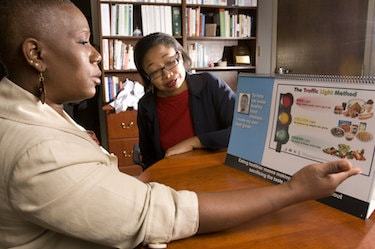 Public health professions add an entirely new level to healthcare careers; rather than providing direct services to individual patients, these professionals study the bigger picture of health in communities. They are the unsung heroes who plug the many pieces of the healthcare industry together to create integrative services for patients and healthcare providers.
Public health professions add an entirely new level to healthcare careers; rather than providing direct services to individual patients, these professionals study the bigger picture of health in communities. They are the unsung heroes who plug the many pieces of the healthcare industry together to create integrative services for patients and healthcare providers.
An online public health degree will teach you an interdisciplinary approach to disease prevention, human services and healthy living. Your studies will encompass many different subjects—from economics to sociology to law—but each topic has a unique connection to public health. You’ll learn ways to educate the general public about environmental concerns, outbreak control and policy concerns. Your program may even let you specialize in a certain area, such as health and food safety, industrial hygiene or occupational safety. This field gives you the chance to work in healthcare, but generally in a preventive and educational position.
THE CAREER PATH
Individuals with a bachelor’s degree and at least five years of work experience in public health will have the opportunity to take the exam to become Certified in Public Health (CPH), which is administered by the National Board of Public Health Examiners (NBPHE).
Employment is available in both the public and private sector. Options include hospitals, clinics, insurance companies, pharmaceutical businesses and universities. The U.S. government also employs a significant number of public health employees. Other industries include consulting, management and politics. The Bureau of Labor Statistics predicts a whopping 37% growth rate in this field, with robust annual wages of $46,000.
Here are a few of the most popular career choices in public health:
- Community Health Workers
The professionals who link clients with health education and other services. They may develop and implement strategies to improve the health of individuals and their communities. While some states require certification programs of community health workers, it is most common for professionals to practice with no additional education beyond a high school diploma. Although it is easy to jumpstart a career in community health, the demand for qualified professionals is expected to increase in the upcoming years as more of the population seeks community-based and preventative health services. On average, community health workers make around $37,000 each year.
- Epidemiologists
The professionals that investigate the patterns and causes of diseases and injuries in humans. These professionals work to reduce the risk of negative health outcomes through research, community education, and influencing health policies. Epidemiology is the career for professionals looking to expand or specialize their healthcare career in public health and diseases. Epidemiologists all have at least a master’s degree in public health, and some choose to pursue a doctorate specific to Epidemiology. On average, these professionals make nearly $71,000, and as the emphasis on health awareness and integrative practices continues to grow, the demand for these types of professionals will stay right on par with the national average around 6%.
- Medical & Health Service Managers
The professionals that combine business knowledge with healthcare practice and skills. Health administrators plan, direct, and coordinate medical and health services across entire facilities, specific departments, or private medical practices. These professionals tend to have a bachelor’s degree in public health, health administration, or a related degree, in addition to years of experience in the healthcare industry and administrative roles. Health service managers make more than $96,000 on average, so it is well worth the preparation for a field that is expected to see growth at a rate that is more than double the national average.
WHO IS THE IDEAL CANDIDATE?
Public Health careers can be uniquely rewarding as they focus on caring for others. Like all healthcare professionals, public health workers must be driven by compassion and a desire to be of service to others. Across the entire field, they must be able to communicate with both clients and other healthcare providers. Professionals who seek positions in public health do best when they are detail-oriented critical thinkers with the ability to solve complex problems.
WHAT SHOULD I LOOK FOR?
Varying positions in public health will require different levels of education and work experience, which makes this career a great choice for a broad range of aspiring professionals. You can earn a certificate or associate’s degree if you’re interested in shorter-term study. Bachelor’s degrees are also available. If you’re interested in more intense research, consider a master’s degree or doctoral program. Some programs are more academic in nature, while others stress interaction with the public. Community health workers, for example, may be able to initiate their career without any specialized education at all. Epidemiologists on the other hand, will usually obtain at least a master’s degree in public health, or an advanced education with a specialization in epidemiology.
Typical undergraduate courses will span public policy, nutrition, biology and healthcare systems. As a graduate student, your public health degree may cover biostatistics, epidemiology and management courses. Other common courses, regardless of the degree level, include infectious diseases, food safety, public health education and global health issues.
For students who decide to pursue a master’s degree or beyond, programmatic accreditation is available through the Council on Education for Public Health (CEPH).
COST
Our rankings reveal that the average cost of an online MPH to be around $30,000. However, the most affordable online MPH programs cost less than $8,000 while the most expensive cost more than $70,000. Click on a listing below to see accreditation and total estimated cost including fees.
